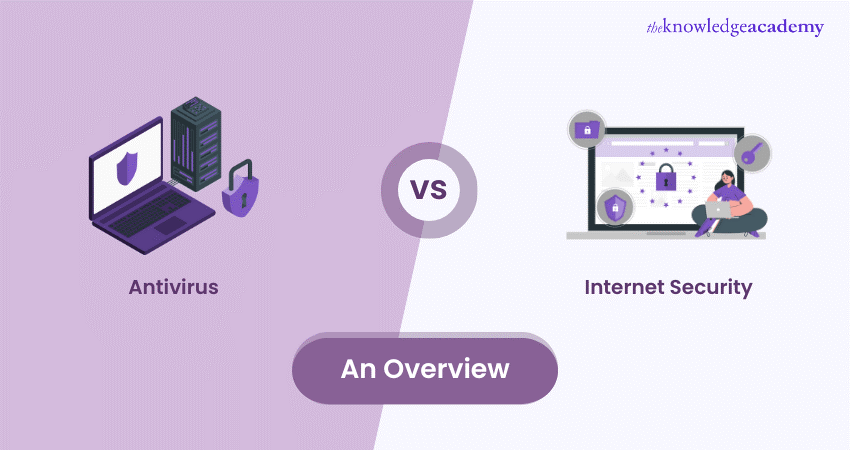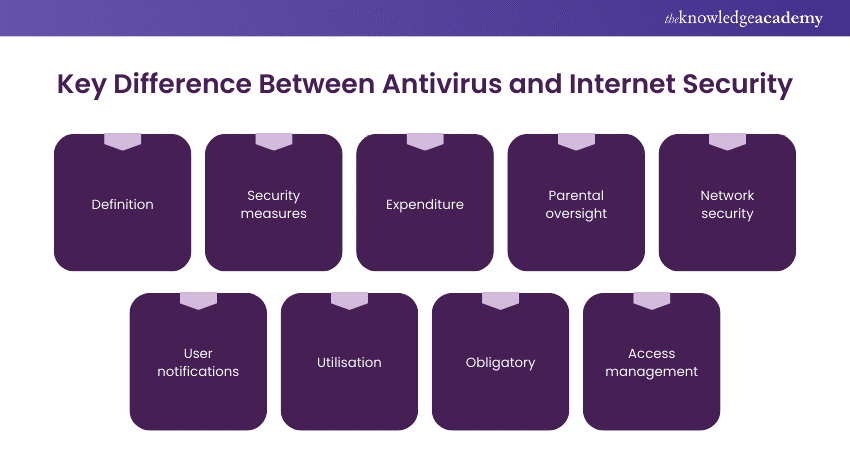We may not have the course you’re looking for. If you enquire or give us a call on +352 8002-6867 and speak to our training experts, we may still be able to help with your training requirements.
Training Outcomes Within Your Budget!
We ensure quality, budget-alignment, and timely delivery by our expert instructors.

Antivirus and Internet Security are essential software for your device and data protection. They help you prevent, detect, and remove malware and online threats that can damage your device, data, or online security or privacy. However, Antivirus and Internet Security are different. They have distinct features, strengths, and weaknesses that suit different devices, users, and needs. Therefore, one question naturally arises: “What is the difference between Antivirus and Internet Security?" Which one is better
In this blog, we will compare Antivirus and Internet Security in terms of definition, security measures, and expenditure. We will also highlight the difference between Antivirus and Internet Security and how they affect your device and data protection. By the end of this blog, you will have a clear understanding of the two and which one is better for you.
Table of Contents
1) What is Antivirus?
2) What is Internet Security?
3) Key Difference Between Antivirus and Internet Security
4) Pro and Cons of Antivirus
5) Conclusion
What is Antivirus?
Antivirus software detects and removes malicious programs like viruses, worms, trojans, ransomware, spyware, and adware from your computer or device. These malicious programs can infect your device through various sources, such as removable media, email attachments, or software downloads, and cause various problems. These problems include the following:
a) Slowing down your device
b) Deleting or encrypting your files
c) Stealing your personal information
d) Displaying unwanted ads
Antivirus software scans your files, folders, and system memory for any signs of infection and quarantines or deletes the threats. Antivirus software also updates itself regularly to keep up with the latest malware definitions and signatures, which are the unique codes that identify each malware.
What is Internet Security?
Internet Security is a broader term that includes Antivirus, other features and tools. These tools help protect your online activities and data from hackers, scammers, and identity thieves. These online threats can compromise your data and privacy, such as:
1) Intercepting your network traffic
2) Hacking your accounts
3) Phishing your credentials
4) Spamming your inbox
5) Impersonating your identity
Internet Security software may include firewall, VPN, anti-phishing, anti-spam, password manager, parental control, web browser protection, and more. Internet Security software monitors your network traffic, encrypts your data, blocks malicious websites and emails, and alerts you of any suspicious activity.
Key Difference Between Antivirus and Internet Security
In this section, we will explore the Difference Between Antivirus and Internet Security:

1) Definition
Antivirus is a software that protects your device from malware, which are malicious programs that can seriously harm your device or data. Internet Security is software that effectively protects your device and data from online threats. They offer protection from malicious actors or activities that can harm your privacy and online security.
2) Security measures
Antivirus provides basic security measures, such as scanning, removing, and updating, which are essential for detecting and eliminating malware from your device. Internet Security provides advanced security measures, such as firewall, VPN, anti-phishing, anti-spam, password manager, parental control, web browser protection, and more. They are essential for preventing and protecting your online activities and data from hackers, scammers, and identity thieves.
3) Expenditure
Antivirus is usually cheaper than Internet Security, and some Antivirus software are even free. However, free Antivirus software may have limited features, functionality, or support and may not be able to protect you from all types of malware or online threats.
Internet Security is more expensive than Antivirus, but it offers more value and features for your money. Internet Security software can provide you with comprehensive and multi-layered protection, as well as additional benefits. This includes customer service, technical support, or a money-back guarantee.
4) Parental oversight
Antivirus does not have parental oversight features, which means you cannot control or monitor what your children do online. This can expose them to inappropriate content, cyberbullying, online predators, or other online risks.
Internet Security has parental control features, which allow you to set limits, block inappropriate content, and track your children’s online activity. You can also manage their screen time, filter their search results, or restrict their access to certain apps or websites.
5) Network security
Antivirus does not protect your network from hackers, who can exploit vulnerabilities and access your devices and data. Hackers can use various techniques to intercept your network traffic, steal your data, or hijack your sessions. Let’s explore some of these techniques below:
1) Port scanning
2) Packet sniffing
3) Man-in-the-middle attacks
Internet Security has firewall and VPN features, which secure your network and prevent unauthorised access. Firewall monitors and controls your incoming and outgoing network traffic, and blocks any unwanted or malicious connections.
VPN creates a secure encrypted tunnel between your device and the internet. It effectively hides your IP address and location, making you anonymous and untraceable online.
6) User notifications
Antivirus notifies you when it detects or removes malware or when it needs to update. This can help you stay informed of the status and performance of your Antivirus software and act if needed.
Internet Security notifies you when it blocks or warns you of malicious websites, emails, or downloads, or when it detects or prevents any online attack. This can help you stay safe and avoid falling victim to any online scam or fraud.
7) Utilisation
Antivirus is easy to use and does not require much configuration or customisation. You can simply install it, run it, and let it do its job. Antivirus software usually has a simple and user-friendly interface and does not consume much of your device’s resources or battery.
Internet Security is more complex and may require some technical knowledge and skills to use and optimise. You may need to adjust the settings, preferences, or features of your Internet Security software, depending on your needs and preferences. Internet Security software usually has a more sophisticated and comprehensive interface and may consume more of your device’s resources or battery.
8) Obligatory
Antivirus is obligatory for any device that connects to the internet, as malware can infect your device through various sources. This includes removable media, email attachments, or software downloads.
Malware can cause various problems, from deleting your data to stealing your private data. So, you need Antivirus software to protect your device from malware and keep it running smoothly and efficiently.
Internet Security is obligatory for any device that stores or transmits sensitive or personal data, such as banking details, passwords, or identity documents, as online threats can compromise your data and privacy. You need Internet Security software to protect your data from online threats and keep it safe and secure.
9) Access management
Antivirus does not manage your access to different websites or services, which means you can visit or use any site or service you want, regardless of its security or reputation. This can expose you to malicious or harmful websites or services, which can infect your device, steal your data, or scam you.
Internet Security manages your access to different websites or services, which means it can block or restrict your access to sites or services that are unsafe, malicious, or inappropriate. This can protect you from malicious or harmful websites or services, which can harm your device, data, or online security or privacy.
Master the art of Cyber Security with our Certified Cyber Security Professional (CCS-PRO) Course – Sign up now!
Pros and cons of Antivirus and Internet Security
In this section, we will explore the pros and cons of Antivirus and Internet Security.
Pros and cons of Antivirus
Antivirus software has some advantages and disadvantages, let’s explore them in the following table:
|
Pros |
Cons |
|
Protects your device from malware |
Does not protect your data from online threats |
|
Easy to use |
Does not have parental control features |
|
Updates regularly |
Does not secure your network |
|
Notifies you of malware detection or removal |
Does not notify you of online attacks |
Pros and cons of Internet Security
Internet Security has some benefits and drawbacks, let’s explore them in the following table:
|
Pros |
Cons |
|
Protects data and privacy |
Can be expensive and complicated |
|
Ensures business continuity |
Can affect performance and usability |
|
Enhances customer trust |
Can create false security |
|
Gives competitive advantage |
Can be hacked or compromised |
|
Enables early detection and response |
Can raise ethical and legal issues |
Take the first step towards becoming an Online Security Specialist with our Online Internet Security Specialist Training – Sign up now!
Conclusion
Antivirus and Internet Security are both essential for your device and data protection, but they are not the same thing. Antivirus protects your device from malware, while Internet Security protects your device and data from online threats. Using both Antivirus and Internet Security in combination ensures optimal protection of your systems and data.
Discover the pathway to success with our Virtual Online Job Roles Training – Sign up now!
Frequently Asked Questions

Yes, you can use Antivirus and Internet Security software together if they are compatible and do not conflict. Some Internet Security software already includes Antivirus features, so you do not need to install separate Antivirus software.

Antivirus and Internet Security are both important, and you should not choose one over the other. Antivirus protects your device from malware, while Internet Security protects your device and data from online threats. You need both Antivirus and Internet Security software for optimal protection.

The Knowledge Academy takes global learning to new heights, offering over 30,000 online courses across 490+ locations in 220 countries. This expansive reach ensures accessibility and convenience for learners worldwide.
Alongside our diverse Online Course Catalogue, encompassing 17 major categories, we go the extra mile by providing a plethora of free educational Online Resources like News updates, Blogs, videos, webinars, and interview questions. Tailoring learning experiences further, professionals can maximise value with customisable Course Bundles of TKA.

The Knowledge Academy’s Knowledge Pass, a prepaid voucher, adds another layer of flexibility, allowing course bookings over a 12-month period. Join us on a journey where education knows no bounds.

The Knowledge Academy offers various Virtual Online Job Roles Courses, including Online Internet Security Specialist Training, Certified Cyber Security Professional (CCS-PRO) Course and more. These courses cater to different skill levels, providing comprehensive insights into Cyber Security.
Our Business Skills Blogs cover a range of topics related to Internet Security, offering valuable resources, best practices, and industry insights. Whether you are a beginner or looking to advance your Internet Security skills, The Knowledge Academy's diverse courses and informative blogs have you covered.
Upcoming Business Skills Resources Batches & Dates
Date
 Online Internet Security Specialist Training
Online Internet Security Specialist Training
Fri 14th Feb 2025
Fri 11th Apr 2025
Fri 13th Jun 2025
Fri 15th Aug 2025
Fri 10th Oct 2025
Fri 12th Dec 2025







 Top Rated Course
Top Rated Course



 If you wish to make any changes to your course, please
If you wish to make any changes to your course, please


